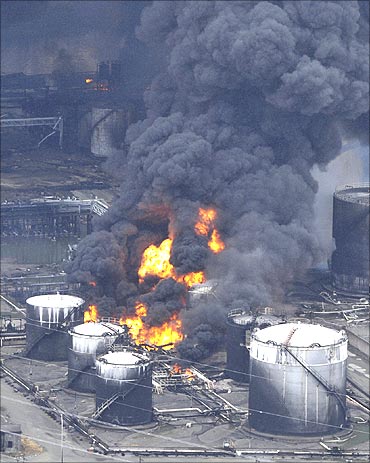
Last year, the Japanese economy lost the title of being the world second largest economy to China. The Japanese economy had fallen by 1.3 per cent in the last three months of 2010.
With the earthquake and tsunami shattering the recession-hit economy, Japan's road to recovery will be an uphill task. Also, with dangers of radiation leaking from its nuclear reactors might well add to the human and material cost further.
Some analysts believe that Japan's economy is resilient and will pull through this catastrophe, but others fear that the world's third-largest economy may slip into recession given the crippling impact of the devastating earthquake and tsumani.
The Kobe earthquake in 1995 had devastated the economy, however, the following year, industrial output rose and growth was on track.
Fifteen years after the tragedy, it's not just the natural catastrophe that is haunting Japan.
A strong yen, falling exports, and Japan's mounting debts are adding more burden to the $5 trillion economy.
Japan's debt burden is among the highest and is pegged at around 200 per cent of its yearly economic output.
PTI, Business Standard & AgenciesClick NEXT to read how the earthquake might derail the Japanese economy . . .
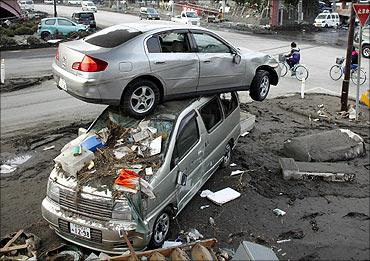
The turmoil had rattled the national economy, which is beset by the problem of an ageing population.
The domestic currency has been on the rise adversely impacting exporters as their wares are becoming less attractive in the international markets.
The island nation is prone to natural disasters and going by reports, the earlier big earthquake in 1995 had resulted in a loss of over 10 trillion yen for the Japanese economy.
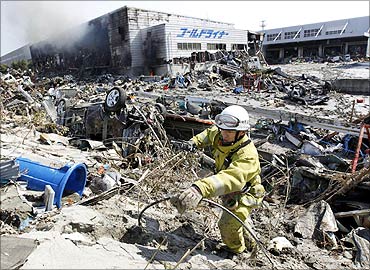
Rising global prices for oil, food and natural gas will be roadblocks in Japan's thorny path to recovery.
The damage to Japan's nuclear power stations, ports and infrastructure will also take time to rebuild.
Tepco, the biggest power company in Japan said the power cuts would hit 3 million customers, including large factories. Power supply will be fully restored by the end of April.
. . .
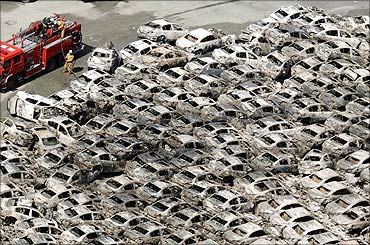
The earthquake has halted production in one of the world's largest vehicle manufacturing nations.
Big manufacturers like Toyota, Nissan, Honda have also shut down their operations.
Japanese auto major Honda had said it postponed the preview of its small car Brio in India scheduled for March 17 due to earthquake.
Toyota postponed the official inauguration of its second Indian manufacturing facility at Bangalore in view of the earthquake and tsunami.
Toyota imports engines and transmissions for the sedan from the parent company in Japan. Toyota Motor Corporation has closed two plants in Japan with a combined annual capacity to roll out 420,000 small cars.Mitsubishi has halted production at its three domestic assembly plants.
. . .
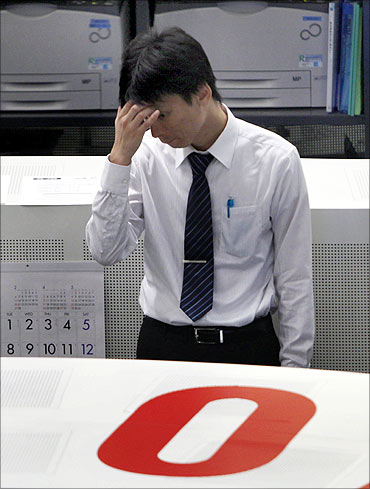
The Tokyo Stock Exchange saw one of the worst crashes on Monday. A huge selloff resulted in a whopping loss of $287 billion, after a massive earthquake and Tsunami spread havoc in Japan.
Despite the monetary easing moves, investors went into panic selling that saw the domestic stock market tumble over six per cent, one of the biggest losses in recent times. Benchmark Nikkei 225 dropped 6.18 per cent to 9,620.49 points.
Auto and electronics makers were the worst hit in the bourses. On Monday, Sony Corp shares fell by 7.7 per cent down after the company shut production at eight plants.
Nissan's shares dropped 8.5 per cent, as it shut four auto assembly plants in Japan.
Toshiba Corp's shares crashed by 16.3 per cent and Hitachi also fell more than 15 per cent.
. . .
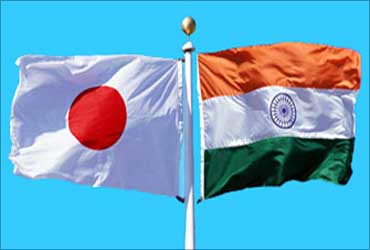
India's trade with Japan is likely to be hit in the short term as fresh orders for exports will take time. Exporters will face payment delays. India's major export items to Japan include steel, ores, chemicals and pearls, while import products comprise machinery, vehicles, mechanical appliances and rubber.
The tourism sector will also be affected, as many Japanese tourists cancel their vacations plans to India.The overall bilateral trade between India and Japan stood at $10.3 billion in 2009-10. This was earlier expected to touch $25 billion by 2014.
Maruti Suzuki India said it is assessing the possible impact of the devastating earthquake
in Japan on its components import from there, while cancelling celebrations to mark one crore production milestone in India.
The company usually has buffer stock of components for about two weeks and till then normal production will continue.
. . .
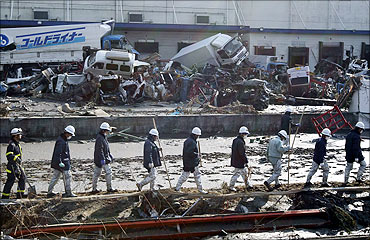
Japanese consumer electronics firms, including Panasonic, Canon and Nikon, on Monday said their businesses in India are unlikely to be affected in the immediate future despite damages to their factories in the island nation due to the earthquake and tsunami.
"We do not see immediate impact in terms of our business. We already have two months stocks of our products and we mostly import from Singapore," Canon India senior vice president Alok Bharadwaj told PTI.
. . .
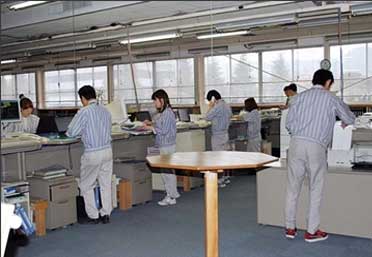
At present, most of its products, including cartridges for printers, mid and high end cameras, are manufactured in factories located in Japan.
Bharadwaj said India's contribution to the global sales of Cannon is relatively small.
Last year Canon India had a revenue of Rs 1,260 crore (Rs 12.60 billion), while that of Canon Inc was at $37 billion.Canon said last week's natural disaster affected seven plants located in Northern Japan, of which two are severely damaged.
. . .
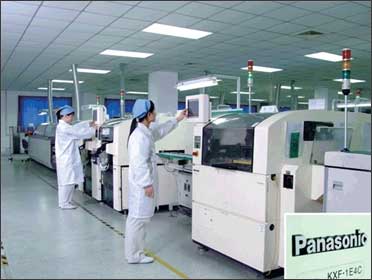
Panasonic India which imports high-end plasma television and cameras from Japan, said the company's operations here have not been impacted as it sources most of its products from other countries like Indonesia and Malaysia.
In a statement Panasonic Corporation said the tragedy has affected its business. "Like all Japanese companies, Panasonic was also affected by the terrible natural disaster that ravaged Japan."
. . .
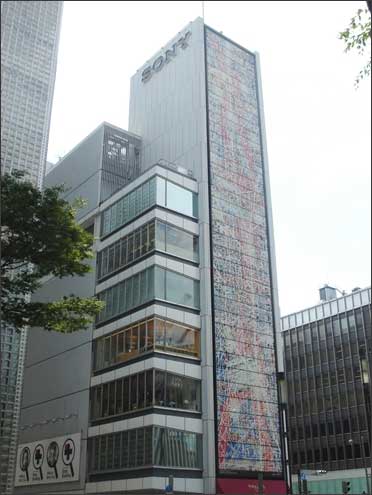
While consumer durables giant Sony did not comment on the impact of its business for the Indian market, the company has halted operations in all the six factories in Japan.
"Due to continuing power cuts, we are unable to examine the damage at the factories with accuracy. Consequently, it is impossible to determine the estimated cost of damage, or when the damaged factories will resume its operation at this point in time," Sony said in a statement.
. . .
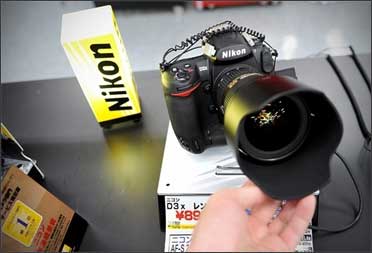
Similarly, another leading Japanese firm Nikon said though the tragedy will have an impact on its global sales, the company does not foresee any immediate shortage of products in the near future for the Indian market.
"We import our DSLR cameras and some raw materials from Japan. At present, we are not facing any delay in our shipment and we do not see any shortage in the immediate future," Nikon India general manager (sales and marketing -imaging division) Sajjan Kumar said.
. . .
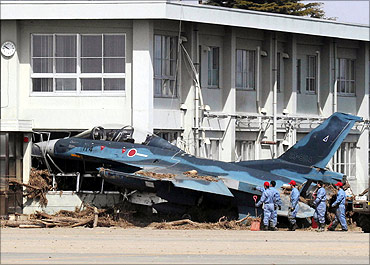
The number of overseas tourists visiting Japan jumped 26.8 per cent to an all-time high of 8.6 million in 2010.
Visitors from China, France, Malaysia, Singapore and Thailand also hit record highs.
The tourism industry will be badly hit by the earthquake and Tsunami. In 2009, Japan received over 59,000 tourists from India.
Japanese tourists to India, especially visiting Buddhist monasteries, will also be affected. Accounting for 2.4 per cent of the total visitors, Japan is among the top ten countries in terms of Foreign Tourist Arrivals (FTA) to India.Nippon Airways, Japan's largest carrier, cancelled 131 flights affecting 32,700 passengers since the disaster struck on Friday.
Many other airlines have suspended their services to Japanese destinations.
. . .
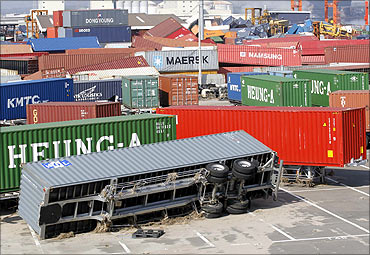
Some of the world's biggest luxury goods manufacturers will bear the brunt of the natural disaster.
Brands like Louis Vuitton, Burberry will be affected as the high spending Japanese will curb expenses.
Japan accounts for about 11 per cent of global luxury goods sales. This will be cut down drastically as crisis-hit Japanese try to scale down their budgets.
. . .
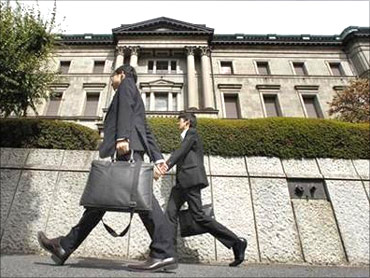
Japan's central bank on Monday unveiled plans to pump in 15 trillion yen (about $183 billion) into the economy grappling with after effects of the natural calamity, including fears of nuclear meltdown, as stocks tumbled over 6 per cent.
The apex bank has widened its asset purchase programme which along with extending funds worth about 10 trillion yen for daily bank operations, is worth about 15 trillion yen.
"This morning, the bank conducted a same-day funds supplying operation totalling 7 trillion yen, which was the largest amount ever conducted, and a future-day-start funds supplying operation totalling 3 trillion yen," Bank of Japan (BoJ) said in a statement. Separately, the central bank said it would increase the amount for the existing Asset Purchase Programme by about 5 trillion yen.
. . .
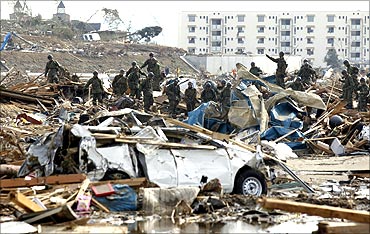
It has been reported that the most important industrial and agricultural regions of Japan have not been seriously impacted, either by the quake or the tsunami.
Some analysts speculate that a repatriation of capital from overseas, both for security and reconstruction, may drive the Yen up rather than down. This, along with the disruption caused to shipping activity could hurt Japan's exports. The enormous reconstruction work will impose a fiscal burden that Japan can bear, provided the government is able to tap into private savings.